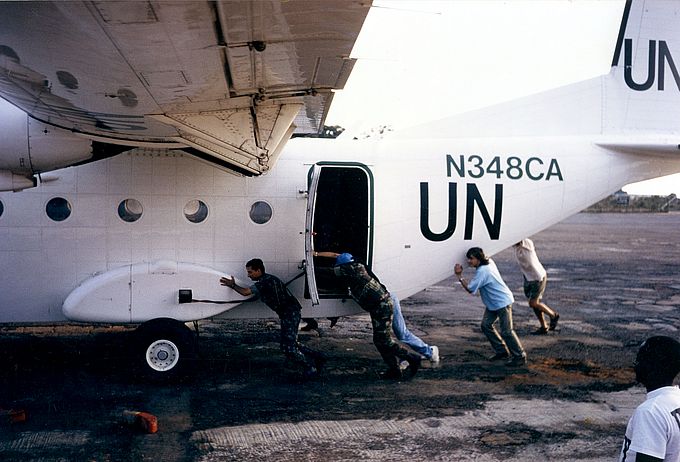Emergency relief means more than immediate life-saving assistance. Taking into consideration the social, political, and economic causes of the actual situation we seek a sustainable cooperation with our partners on long-term programs. We do therefore send neither volunteers nor specialists. Instead, we work with civil society actors striving to exercise their own concepts, yet in situations of emergency. Using local capacities, we avoid the actors to rely on support permanently, and to degrade them as objects in passive need for protection. Contrarily, the work with responsible partners enables us to create sustainable cooperation. Final aim remains to make aid redundant.
Our term ‘critical emergency relief’ describes a concept which sees assistance as part of political action to overcome misery and incapacitation sustainably. With a cause-based approach critical emergency relief differentiates itself from other aid concepts, which most often try to ease emergency situations by imposing means from outside instead of aiming at sustainable solutions imbedded into the societal context at hand. Intentionally or unintentionally, this kind of “fast aid” often supports the stabilisation of (global-) societal relations, which produce misery and interdependencies systematically.
Elementary for critical emergency relief is the constant reflection of both, the relation between aid-givers and aid-receivers, as well as the social, political, and cultural circumstances, in which the assistance takes place. As it is generally known one of the features of relief is its dual character. On the one hand assistance for people in emergency situations is a precept of humanity of which existential survival might be dependent; on the other hand assistance can contribute to sustain the circumstances which are creating such emergency situations. By trying to ‘repair’ faults of such systems, relief helps to overcome political legitimation deficits. To such ambivalences critical emergency relief reacts with the attempt to defend existing relief offers, where at the same time criticizing and trying to overcome them. As necessary it is, for instance to avoid the further erosion of social aid, the more important it is to reject the authoritarian character of social aid and to pressure for a transformation into adequately calculated money for basic existence.
General consensus exists about the moral-ethical basis for help workers. Critical emergency relief, as well, is based on individual readiness to help others. Moreover, it tries to create societal agreements to ensure a legal claim to relief in situations of emergency. Consequently assistance will not just be the product of charity and pity but will be imbedded in forms of democratically formulated solidarity. The origins for this understanding are the major human rights declarations, especially the ‘International convention about economical, social and cultural rights” from 1966. By signing it, contracting states are obliged to ensure the right to social security, to a life without hunger and to the highest possible state of health.
Thus, in the currently valid law of nations, overcoming misery is a legal demand of which its realisation lies in the responsibility of the state. However, due to the crisis in national state policies, the rights of the people become more and more unsecured nowadays. The protection of citizen’s rights, “the right to have rights” (Hannah Arendt), are more under pressure, as a consequence of neoliberal globalisation strategies. Clear is, that under those global relations, realisation of social right is only possible under the precondition of their global enlargement. Here enlargement does not mean the establishment of a global welfare state, but the creation of an alliance between international contracts which ensure social equalisation, and thus the liberation from misery and interdependencies.
To fight the global health catastrophe a system of, for example citizens rights based financing could be possible, with which the more prosperous country could compensate the health needs in the poorer countries. Such a system would pick up and internationalise the principle of risk sharing, which builds the core principle in the solitary health insurance system. In that way assistance in emergency situation would no longer be dependent on the good conduct of the people in need, neither on the selfish considerations of the helpers, nor on the medial economic situation.
Critical emergency relief is based on the idea of a different, better world. It is against the neoliberalistic tendency of the “depoliticalisation of the political”, in which relief shall be reduced into a simple technical-pragmatic backup. However, the paradox of emergency assistance becomes larger, with the image of a non-political, pure humanitarian aid. The more uncritical assistance is, the bigger is the risk that it will be exploited for means which do not aim at overcoming misery and interdependencies. The separation between humanitarian and political issues, which we experience today, is the most extreme phase of creating distance between citizen’s rights and human rights. Ultimately, the humanitarian organisations, which get closer and closer to the supranational organisations, can capture the human life just in figures of the naked life and thus, without consciousness build a secret solidarity with the powers they want to fight.” (Georgio Agamben)
Critical emergency relief on the contrary intervenes on the side of suffering people and takes a position towards those structural forces which are responsible for misery and neediness.

